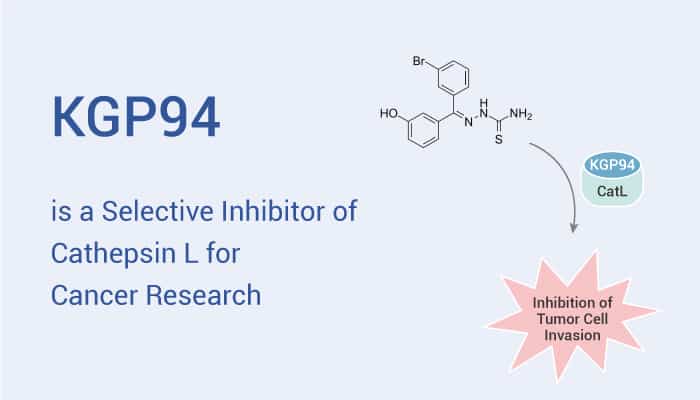Cathepsin L is a lysosomal cysteine protease. Particularly, it may play a key role in various biological and disease processes through intracellular and extracellular protein degradation. Obviously, cathepsin L is a ubiquitously expressed cysteine protease located in lysosomes under normal conditions. However, cancer cells secrete cathepsin L to help invasion, metastasis and initiate angiogenesis. The loss of cathepsin L (CTS L) is relevant to a rapid proliferation rate and enhanced glycolytic metabolism. Specifically, it depends on the activity of lactate dehydrogenase A (LDHA). However, cathepsin L inhibition resulted in increased LDHA protein expression. Cathepsin L regulates this metabolic circuit to control cell division.
Besides, both the MMP and cathepsin families of proteases contain proteases with overlapping substrates and functions. Cathepsins, especially cathepsin B and l, are also associated with aggressive tumor behavior and enhanced tumor cell invasion. Moreover, cathepsin L has a potential role as a target for inhibiting cancer resistance to chemotherapy. The combination of cathepsin L inhibitor and doxorubicin also strongly inhibited the proliferation of drug-resistant tumors in nude mice. Furthermore, cathepsin L is a key host cysteine protease used by coronavirus for cell entry. It is a promising drug target for new anti-SARS-Cov-2 antiviral drugs. Today, we will introduce a selective inhibitor of cathepsin L, KGP94.
KGP94 is a Selective Inhibitor of Cathepsin L for Cancer Research.

At first, KGP94 is a selective inhibitor of cathepsin L with an IC50 of 189 nM. Nonetheless, KGP94 inhibits migration and invasion of metastatic carcinoma and shows low cytotoxicity (GI50=26.9 µM) against various human cell lines.
Secondly, KGP94 with 10 or 20 μM for 24 h reduces the expression of M2 (macrophage) markers (Arginase-1 and CD206). Meanwhile, KGP94 reduces cell invasion of primary bone marrow-derived macrophages or Raw264.7. In brief, KGP94 impairs the invasive capacities of both prostate and breast cancer cells by 53% and 88%, respectively. KGP94 suppresses secreted CTSL activity by 94% and 92% in PC-3ML and MDA-MB-231, respectively.
Thirdly, KGP94 with 20 mg/kg/day by i.p. for 3 days exhibits anti-metastatic and anti-bone resorptive efficacy in a prostate cancer bone metastasis model. In addition, KGP94 reduced 65% in metastatic tumor burden and 58% in tumor angiogenesis, improving the survival of bone metastases bearing mice.
Finally, KGP94 is a selective inhibitor of cathepsin L.
References:
Sudhan DR, et al. Clin Exp Metastasis. 2013 Oct. 30(7):891-902.
Sudhan DR, et al. Int J Cancer. 2016 Jun 1;138(11):2665-77.